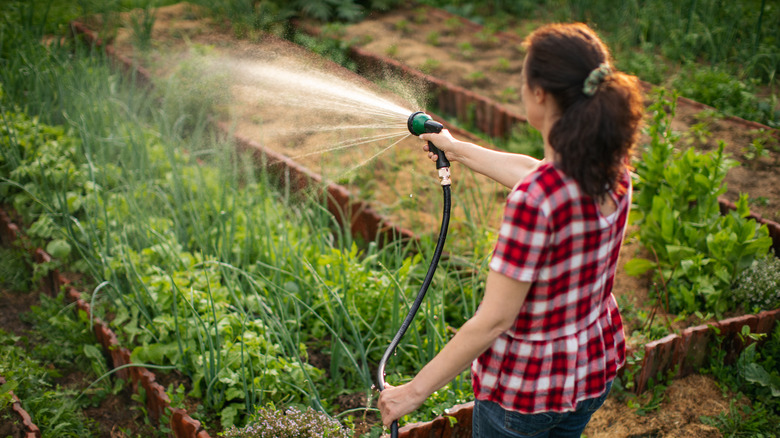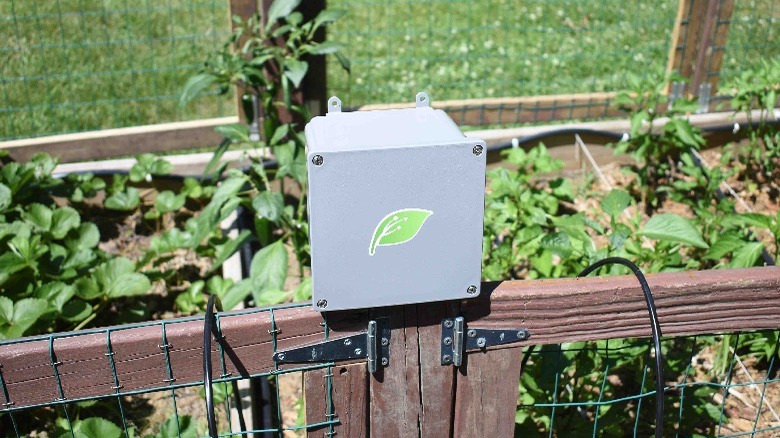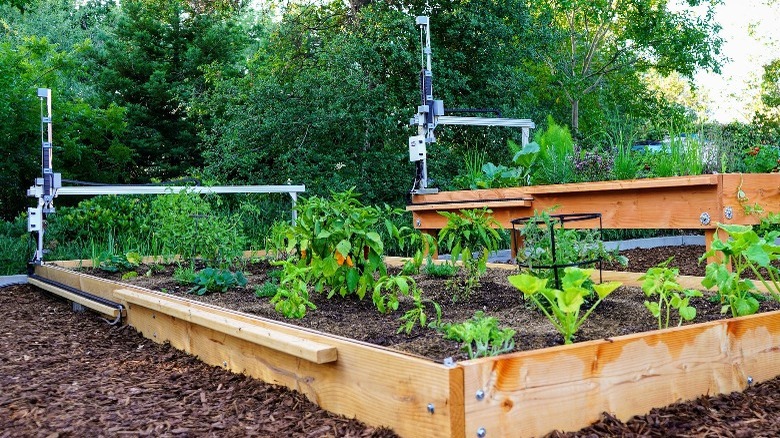3 Raspberry Pi Projects That Could Be Useful For An Open Garden
We may receive a commission on purchases made from links.
Having an outdoor garden is a great way to spend some time under the open sky. It can also help you destress, get a little fresh produce, and offset your grocery bill. Some people might enjoy getting away from their screens to spend a bit of quality time down in the dirt, but there are a lot of different ways that technology can actually help your garden grow. In fact, there are several projects that you can do with a Raspberry Pi in your own backyard.
Makers and DIY enthusiasts love the Raspberry Pi for its small form factor, affordability, and surprisingly robust processing capabilities. This makes it an ideal mini-computer for powering all kinds of cost-saving, custom home projects. These projects aren't just limited to your indoor hang-out spaces though. There are plenty of outdoor projects that bring the best of nature and technology together so that you can spend less time fretting over your garden and more time enjoying it. Finding solid Raspberry Pi projects can be tricky since many of them are incomplete, buggy, or no longer supported. One of the best ways to find the ones that work is to take a look at the projects listed on maker and DIY forums and then double-check their source sites to make sure they're still fully operational. Here are five of the most useful Raspberry Pi projects for an open garden.
MudPi hydroponics system
MudPi is a scalable smart gardening system. It's designed to work with your existing irrigation, so you aren't locked into any specific gardening method. You simply need to set up a main controller unit which handles all of the task management. The most important feature this performs is soil moisture regulation. It uses a series of sensors to detect when moisture is low and then controls valves leading to sprinklers, soaker hoses, or any other irrigation method you might choose to use.
The possibilities go far beyond simply turning access to a hose on and off though. MudPi can also be integrated with sensors that monitor water tank levels and analyze humidity, temperature, rain, and light intensity. It also logs and publishes these readings so you can monitor them and find out if there's a problem right away. The system has been so successful that the developer has started to manufacture its own development boards which can be used to expand the device's capabilities even further.
Setting up a MudPi system isn't exactly easy, but several guides on the developer's website walk you through how to install MudPi and use it to regulate your garden.
FarmBot automated garden
Those who are looking for a larger undertaking might be interested in constructing their own CNC-style farm system. FarmBot is a system that involves constructing a level garden bed and then installing tracks along its edges which can be navigated by an automated planting, monitoring, and irrigation system.
This is a 3D printer-like robotic arm that individually seeds, waters, and monitors soil moisture for each of your plants individually. It also adjusts to weather, minimizing water waste and ensuring that each plant gets the exact amount of fluid that it requires. On top of all that, this is the only Raspberry Pi-based system that will actually get rid of weeds. It knows exactly where it planted each of the seeds, and it uses a camera built into the Z-axis of the frame to detect any unwanted sprouts and then crushes them back into the soil, disrupting the development of their burgeoning root system.
Unfortunately, building one of these isn't cheap or simple. FarmBot sells kits that cost around $1,500, but the developer estimates that people who use this system will be able to recoup their loss in fresh produce in about four years. Those who wish to take a DIY approach can purchase and print their own components, and then still take advantage of the FarmBot open-source software and web app though.
This is maybe a bit less practical than some of the other systems on this list, but the merits of a project like this aren't merely measured by their utilitarian benefits. Sometimes it's just fun to build a gardening robot.
MotionEyeOS camera
Weeds and weather aren't the only threats to your garden. Animals can wreak destruction on your plants as well. Maybe you have deer coming to eat the tops off your tomato plants, rodents coming to gnaw at your leafy greens, or birds stealing your berries from the vine. You can put up wire fences and mesh covers, but sometimes these clever critters still manage to get in. One of the best ways to figure out how they're gaining access is to catch them in the act.
MotionEyeOS is a program that can be used to turn any USB webcam into a motion-activated device that can transmit images via WiFi through the use of a Raspberry Pi. This software is popular for home security, trail cameras, and even making smart bird feeders, but you can also use it to keep an eye on your garden. This can help you find out what's been getting into your crop, and better yet, how they've been penetrating your defenses.
There is a guide for making a simple Raspberry Pi-powered outdoor camera trap on the Instructables website. All you need is a Raspberry Pi Model B+ or newer, a microSD card, a camera, a portable battery pack, and a clear plastic food container. You'll want to make sure to get a camera with night vision if you suspect your vandals of visiting after daylight hours.
Our methodology
I've been growing produce in my small, backyard garden for over a decade. I'm no farmer, but I am familiar with the needs of a basic home garden and the systems that would be of the most benefit to weekend gardeners like myself. In order to construct this list, I examined several popular maker and DIY forums in search of the most popular Raspberry Pi projects relating to maintaining an open, outdoor garden. Once I had a handful of prospects, I looked at each of their source pages and attempted to verify that the software was readily available and that it was still receiving active support from its developers. I then chose the three projects that I felt would be the most helpful for maintaining an open garden.



